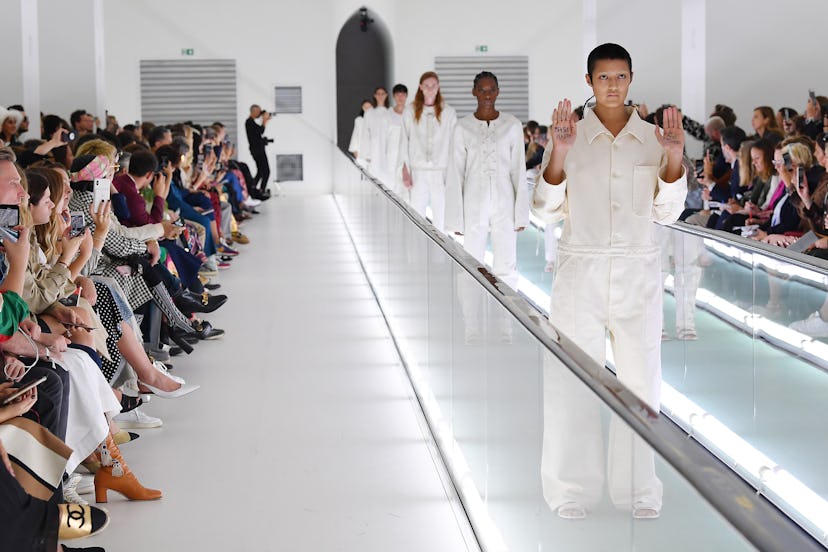Why a Model Protested Gucci’s Spring/Summer 2020 Show on the Runway

It’s not unusual for Gucci shows to feature well over 100 looks. On Sunday, the house’s latest featured so many that creative director Alessandro Michele was able to split the presentation into two parts. The second act saw 88 models take the runway in Michele’s latest riff on his bold-hued aesthetic. And as for the first, well, it couldn’t have been more different: Gucci’s spring/summer 2020 show kicked off with the opening of a set of corrugated metal gates followed by a parade of no less than 21 models wearing variations on the straitjacket.
Part one’s models appeared docile. (Not to mention a bit dead-eyed, which is to be expected this far into the marathon that is Fashion Month.) But not everyone was as pleased with or even indifferent to Michele’s concept. Halfway through the straitjacket parade, one of the models held up their hands to reveal a message, scrawled on their palms in pen: “MENTAL HEALTH IS NOT FASHION.”
“I chose to protest the Gucci S/S 2020 runway show as I believe, as many of my fellow models do, that the stigma around mental health must end,” the model, Ayesha Tan-Jones, wrote in a post featuring a video of the protest on Instagram. “It is in bad taste for Gucci to use the imagery of [straitjackets] and outfits alluding to mental patients, while being rolled out on a conveyor belt as if a piece of factory meat. Presenting these struggles as props for selling clothes in today’s capitalist climate is vulgar, unimaginative, and offensive to the millions of people around the world affected by these issues.”
A model walks the runway at the Gucci spring/summer 2020 show during Milan Fashion Week on September 22, 2019 in Milan, Italy.
Their statement continues:
Worldwide, 1 in 4 people suffer from mental health issues, and LGBTQIA+ individuals are 3 times more likely to experience a mental health condition. LGBTQIA+ youth are 4 times more likely to attempt suicide, experience suicidal thoughts, and engage in self harm, as compared to youths that are straight. 38-65% of transgender individuals experience suicidal thoughts. And for black and brown communities, indigenous communities, and Asian communities in the West, mental health statistics are much higher compared to white adults.
As an artist and model who has experienced my own struggles with mental health, as well as family members and loved ones who have been affected by depression, anxiety, bipolar and schizophrenia, it is hurtful and insensitive for a major fashion house such as Gucci to use this imagery as a concept for a fleeting fashion moment.
Many people with mental health issues are still stigmatized in the workplace and in daily life, while many people still do not consider mental health issues are ‘real illnesses’ as they may not be visible. [Straitjackets] are a symbol of a cruel time in medicine when mental illness was not understood, and people’s rights and liberties were taken away from them, while they were abused and tortured in the institution.
“Many of the other Gucci models who were in the show felt just as strongly as I did about this depiction of [straitjackets], and without their support I would not have had the courage to walk out and peacefully protest,” Tan-Jones, who is non-binary, continued in a follow-up post on Monday morning. Some of the models, they continued, plan to donate a portion of their payment from Gucci to charities dedicated to mental health.
The uniforms and straitjackets, a Gucci spokesperson said, “were a statement for the fashion show and will not be sold.” At a press conference after the show, Michele described straitjackets as “the highest type of uniform,” explaining that for spring/summer 2020, he’d been meditating on uniforms and humanity: “A uniform is something that blocks and constrains you—that makes you anonymous. That makes you follow the direction of travel.” (As for why he decided to change things up this season, Michele told Vogue that he’s “afraid of getting bored. I always have to try something new.”)
Others on Instagram were quick to defend Michele’s intentions. “The clinical whites that opened the show were upsetting—willfully: more a provocative reminder of submission than a glamorization of insanity,” the model, actress, and Gucci muse Hari Nef wrote on Sunday.
Earlier this year, the house also landed in hot water for what it now officially refers to as “the recent unintentional balaclava jumper incident”—aka that time they sold a turtleneck resembling blackface. Ultimately, Gucci pulled the sweater, and responded to the backlash by forming the Gucci Changemakers Council, which supports inclusion and diversity both inside and out of the fashion industry. Having already sparked a larger dialogue about mental health, hopefully, this latest controversy will also lead to some good. (Starting, perhaps, with a reminder of Kering and LVMH’s monumental and yet apparently long forgotten charter, which called for brands to make a psychologist or therapist available to models during working time.)
Related: Adwoa Aboah Opens Up About Her Suicide Attempt on World Mental Health Day